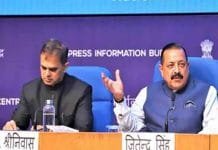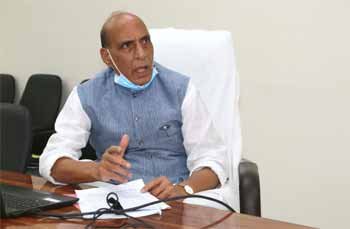– V.Srinivas IAS –
Divisional Commissioner Jodhpur
District Collector Jodhpur
All Additional District Collectors, Jodhpur
All Sub-Divisional Officers, Jodhpur
All Tehsildars of District Jodhpur
Introduction
It’s a moment of immense happiness and nostalgia to address you today in Jodhpur. I return to this conference hall for the first time since October 1999 when I served as District Collector Jodhpur. 1999 was a very challenging year for the Nation, with the Kargil War operations. Jodhpur was a frontline district for air-force/military operations. Shergarh with its high concentration of army personnel working in Rajputana Rifles was receiving a number of martyrs who had sacrificed their lives in the service of the Nation. The National mood in 1999 was one of patriotic fervor and one could often hear people reciting the freedom struggle poems in Jodhpur:
Sarfaroshi ki tamanna ab hamare dil mein hain
Dekhna hain zor kitna bazoon e-qatil mein hain
Waqt aane pe batadenge tujhe e-aasman
Hum abhi se kya bataye kya hamare dil mein hain
The 1999 General Elections were conducted in Jodhpur district amidst huge patriotic fervor. It was also the year when Jodhpur district witnessed severe drought conditions and the Revenue administration took on the yeomen task of providing fodder and water for cattle population and employment opportunities through drought relief works in rural areas. Revenue administration also handled the challenging law and order conditions following the Jat Aarakshan Aandolan and responded effectively to ensure peace amidst large scale protests in both the urban and rural areas of the district. I recall the events of 1999, as they bring forth the resilience and the governance skills of revenue administration.
21st Century Governance challenges for Revenue Administration
The Revenue Officers represent the bulwark of governance and it is collective efforts of Revenue Officers that contribute significantly towards the larger cause of good governance in Rajasthan. Each one of you hold critical governance positions and the institution building efforts that you must engage in, in the Tehsil and Sub-Divisional offices must be marked by a seriousness of purpose and deep commitment to the public cause.
When I served in the districts in the 20th century, it was a period with low bank penetration, subdued credit flows through regional rural banks with the State Bank of Bikaner and Jaipur as Lead Bank of the District. Several Farmers had to borrow from local money lenders at high rates of interest. This has changed significantly. Bank consolidation with the State Bank of India taking over the operations of the State Bank of Bikaner and Jaipur has brought in huge economies of scale. Further the banking correspondents model of financial inclusion has brought banking services to the village level.
21st century Revenue administration works in a Digital age. The Jan Dhan- Aadhar-Bhim applications have ensured universal financial inclusion becomes a reality. Direct benefits transfers based on unique identification numbers and mobile banking are being promoted by the Government. There is considerable awareness levels in the villages on the benefits of technology and ease of doing business. Universal financial inclusion coupled with huge increases in credit flows from banking sector to rural population has increased the challenges for revenue administration in land records management.
Land Records Management and Ease of Business
Major structural reforms have been envisaged in current day administration in the field of land records management. These include Digitization of land records in a single standardized format across various departments, Overhauling litigation in land with reduced timelines and fast tracked courts and judicial processes, Rationalizing stamp duty and reducing the burden of stamp duty, Streamlining property registration system and linking land records to stamp registration, Streamlining the processes to seize collateral under the SARFAESI Act and Providing easy access to Government data and other land related information.
A vast majority of the mortgages/loans are being raised with land as collateral. Every loan necessitates a mutation and an entry in the record of rights. To ensure smooth credit flows, the updation of the record of rights is an essential responsibility. Further the number of mutations to be recorded has increased manifold as also the number of documents for registration. The Digital Land Records Management Project (DILRMP) provides for digital land records which can be used for enhancing ease of business.
In my recent visits to District Collector Offices in Jaipur and Pali, I recognized how quickly the 4 year Records of Rights (the Jamabandi) could be updated in digital format.
I have suggested the following 2 steps for improved land records management and enhancing the ease of doing business in Rajasthan from the Revenue Administration side:
a) Placing the cause lists and judgments of the Board of Revenue and all Subordinate Courts on the website of the Board of Revenue and the State Data Center on the Revenue Courts Management System portal;
b) Linking Sub Registrar Offices with Tehsil Offices in digital format so that the document registration and mutation process are duly interlinked.
The Challenges of Governance in Jodhpur District
Jodhpur district, is a critical district for revenue administration of the State. Its large administrative structures, number of officials deployed and huge geographical spread make it a challenging district for supervision at the District Collector’s level. There is considerable complexity in revenue administration with outdated revenue maps and difficulties in land demarcation at field level.
Huge Case Work in Majority Sub-Divisions: There are a number of new tehsils and new sub-divisions that have been created to assist the District Collector in his supervisory responsibilities. Despite rapid expansion of the number of courts of Assistant Collector and Sub-Divisional Officer, case-loads remain significantly large and unwieldy. The court of SM Jodhpur has 2005 cases, SDM Phalodi has 1831 cases, SDM Osian has 1442 cases, SDM Luni has 1334 cases, SDM Bap has 1182 cases and even the fast track ACM court at Jodhpur has 981 cases. Revenue Courts have to function on a regular basis to reduce case work, otherwise these cases will grow exponentially in the coming months. The cases are largely revenue suits and applications and can only be decided when the Sub-Collectors devote adequate time and attention to Court work.
I woud urge the young Sub Divisional Officers and Assistant Collectors to ensure the sittings of the Revenue Courts are held in a timely and consistent manner. SDM courts must function from 1030 am to 1.30 pm from Monday to Wednesday. The ACM courts must function for 5 days a week from 1030 am to 1.30 pm from Monday to Friday. The court disposal norms must be adhered to.
Familiarity with the provisions of the Rajasthan Tenancy Act and the Rajasthan Land Revenue Act is essential. In addition to familiarity there must be a passion for revenue law and land reforms. Sub Divisional officers may note that it is the duty of the State to protect the rights of Khatedari tenants. Temporary injunction orders against Khatedari tenants cannot be granted. Appointment of a receiver shall be only after hearing both parties.
Absence of Updated Revenue Maps: The last settlement operations in Jodhpur almost 90 years ago and there are several issues with the updation of revenue maps. I will consult the Settlement Commissioner and District Collector in the coming days on the best way forward in the existing situation when the revenue maps have undergone significant revisions.
Large number of Mutations at Tehsildar level: The district is witnessing over 3000 mutations per month. These are very large work-loads at the Tehsil level. Tehsildars may keep in mind the legal provisions of disposal of mutation cases. Mutations must be opened in conformity with the provisions of law. Legal heirs should not be left out. Khasra numbers should be correctly mentioned. A daughter is entitled to a share in property of her father. When natural daughter is alive, mutation cannot merely be entered in the name of sons and widow. It must be ensured that daughters from different marriages also inherit property in equal share. Mutations for partition of holdings in execution of partition deeds duly registered should be undertaken. Partition shall also be effected by a decree of court. Mutations on basis of unregistered will are avoidable. An unregistered will does not give any prima facie right.
Crop Cutting Experiments: In 2017 Kharif season, it is envisaged that Jodhpur district is to conduct 1876 crop-cutting experiments under the Pradhan Mantri Fasal Bima Yojana through the Patwaris and Girdawars. The district currently has 189 patwaris deployed and 16-20 crop-cutting experiments/ patwari for the kharif season are to be conducted. The issue of deploying another agency for the kharif season was discussed with Department of Agriculture recently. The Department of Agriculture was of the view that it is very late for deployment of another agency for crop-cutting experiments. They have agreed to consider providing an additional financial incentive for patwaris taking up the work of crop-cutting experiments. We await a decision from the State Government in this regard. In the interregnum, Revenue Department may commence crop-cutting experiments so that farmers who have suffered crop losses are not deprived their entitled benefits under the crop insurance scheme.
Strengthening Revenue Administration
Government has accorded high priority to creation of Sub Divisions in all Tehsil headquarters. There has also been upgradation of several additional/ sub-tehsils to full fledged tehsils. The State Budget 2017-18 has accorded significant resources for strengthening/ modernization of SDM offices, construction of tehsil offices and for procurement of vehicles. Vehicle procurement may be undertaken at the earliest as sanctions have been issued to District Collectors for this purpose.
Tours of SDO’s and Tehsildars
The foundations of a strong revenue administration are based on timely tours and night halts. I would impress upon each one of you to undertake tours and night halts as mandated in the functions and responsibilities under the Land Records Rules. I have conducted night halts at several Tehsils in the District – Bhopalgarh, Bilada, Pipad City, Osian, Phalodi, Shergargh and Balesar. I have conducted night halts in Tehsil offices, Sub-Divisional Offices and small dak bungalows to pursue the cause of land reforms, with large number of village populations would always be there to meet me seeking redressal of grievances. These memories of numerous night halts and interactions with Tehsildars and Sub-Collectors as also vast village population remain fresh in my mind even after a lapse of nearly 2 decades. I have seen several Revenue Officers rising above personal comforts for the larger cause of rural India and land revenue administration.
Revenue administration is based on the essential premise of close interaction with farmers and protecting the rights of khatedar tenants. The visits must be used to read the Jamabandi majme-aam in the Patwar ghar to understand the pendency of mutations and the magnitude of updations required in the Jamabandi. Tehsildars and SDO’s are to undertake 4 days night halts and these may be conducted with commitment and discipline. Given the smaller size of sub-divisions, inspections of patwar circles can be enhanced as also the inspections of girdawars and tehsiloffices. The old adage of never fudging a TA bill and never fudging a log book must be adhered to.
Once again, I am delighted to be amidst all of you today. I am happy to see several officials who have served with me over the last 3 decades in the meeting. Please accept my good wishes in your challenging policy endeavors.
Jai Hind.
” Address of v.srinivas, ias chairman board of revenue for rajasthan to revenue officers, district collector’s conference hall, jodhpur, dated september 15, 2017 ”
______________
About the author
V.Srinivas IAS
Senior Bureaucrats and Author
___________________
V.Srinivas is an IAS officer of 1989 batch, presently posted as Chairman Rajasthan Tax Board.
He had previously served in the Ministry of Finance and as Advisor to Executive Director (India) IMF, Washington DC. Also worked as Planning and Finance Secretary of Rajasthan.
______________________
Disclaimer : The views expressed by the author in this feature are entirely his own and do not necessarily reflect the views of INVC NEWS.


















